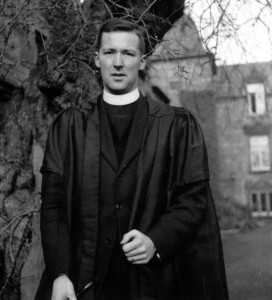By Mark Ellis

Radical theologian William Hamilton, who led the ‘Death of God’ movement in the 1960s, died at his apartment in Portland, Oregon. He was 87.
His writings — along with several other theologians who shared his views — culminated in a famous Time magazine cover story titled “Is God Dead?”
Overwhelmed by the problem of evil and human suffering in the 20th Century – especially the Holocaust — Hamilton ceased to believe that God remained active and engaged in world affairs.
In a 2007 profile in The Oregonian newspaper, he recalled his journey away from orthodoxy, “I wrote out my two choices: ‘God is not behind such radical evil, therefore he cannot be what we have traditionally meant by God’ or ‘God is behind everything, including the death camps — and therefore he is a killer.'”
The same profile noted that his questions began as a teenager when two friends died in an explosion. One friend who perished was Roman Catholic, the other Episcopalian. A third young man – who happened to be an atheist – survived the blast with no injuries.
These swirling questions and new-found convictions led to his 1966 book, “Radical theology and the death of God,” co-written with Thomas J.J. Altizer, who reinforced Hamilton’s thinking.
“The death of God is a metaphor,” Hamilton said. “We needed to redefine Christianity as a possibility without the presence of God.”
His book led to Time Magazine’s infamous cover that asked a nation in the throes of the cultural upheaval of the Sixties, “Is God Dead?” Time nicknamed his movement “radical theology” in its story that appeared April 8, 1966. Hamilton, as one of its leading voices, received death threats and angry letters denouncing him written to newspapers around the country.
Outside the mainstream of his Baptist seminary, he lost his chair as a professor of theology at Colgate Rochester Divinity School the following year.
Hamilton went on to teach at New College in Sarasota, Fla., and then joined the faculty at Portland State University in 1970. He taught classes in religion, literary criticism and death and dying for more than a dozen years. Among his writings were books about William Shakespeare and Herman Melville. His most recent work was a collection of essays titled “Sine Nomine.”
Some think Hamilton inaugurated the current rise of strident atheism, but Hamilton distanced himself from those who attacked religion or Christianity.
“There is a self-righteousness, a glibness in their writing,” he said. “They are too sure of themselves. They’ve backed themselves into a fundamentalist mode.”
Hamilton viewed himself as a Christian who no longer attended church.
“The death of God enabled me to understand the world. Looking back, I wouldn’t have gone any other direction. I faced all my worries and questions about death long ago.”
Hamilton is survived by his wife of 62 years, Mary Jean Golden, a former ballet dancer. Besides his wife, he left behind five children, eight grandchildren and four great-grandchildren. No funeral services are planned.




Ps 14 vs 1a. The Fool has said in his heart, “There is no God”
I never heard him say “there is no God”. “God is dead”, for him, is quite a different thing.
For goodness sake… I am not well read on Hamilton (at all!) but I can see that he was simply asking a question. I will read him but I would be surprised if he actually ever answered that question. I would suspect he simply asked it and pondered it. And, it is a very good question, especially for Christians.
On another point also, if there is a God, or was once a God, then this being through the creation gave us ‘free will’. It’s always puzzles me why people seem to overlook this when trying to assign culpability for the bad stuff that happens in our world. And here it is again in Hamilton’s writing: “…two choices (he says): ‘God is not behind such radical evil, therefore he cannot be what we have traditionally meant by God’ or ‘God is behind everything, including the death camps — and therefore he is a killer.’ It seems nonsensical to me for a creator to give that which it creates free-will and then to at every turn override that faculty by intervening when things get tough or, more importantly, when ‘they’ it’s creations go wrong.
I do not even believe in a God but even I a non-believer can see that in the presence of free will, one is given choice</i)… follow the right way or do otherwise. It is the evil we wreak when we do otherwise that this God, if it is there, will spend most of its time weaping over!
Is it God who is dead?
Or is it our faith in the god of our various religions that is dead or dying?
If the former, end of discussion.
If the latter, how shall we talk of god without the vocabulary of faith?
Comments are closed.